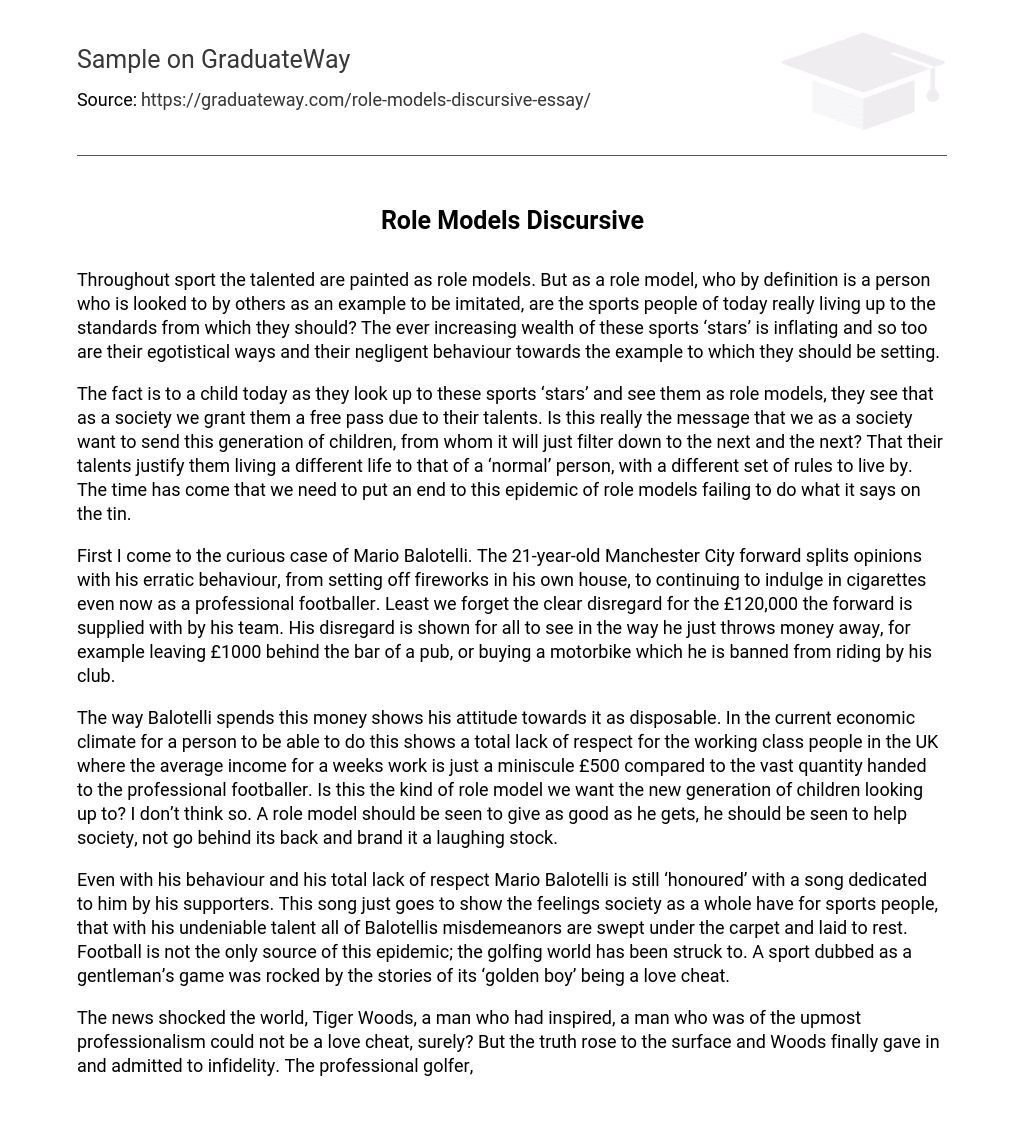In the realm of sports, talented individuals are frequently depicted as role models. Nevertheless, it is worth considering if these contemporary sports figures genuinely embody the anticipated qualities of role models. Their substantial wealth has resulted in inflated egos and a lack of concern for the responsibility they carry to establish a positive example for others to emulate.
Children of today look up to sports stars and see them as role models. Regrettably, society frequently pardons their abilities, conveying the idea that they can abide by separate standards. Is this the message we desire to convey to future generations? It is high time we resolve this issue of role models failing to meet expectations.
Firstly, we need to discuss the interesting situation involving Mario Balotelli. This 21-year-old forward from Manchester City has become famous for his unpredictable behavior. Examples of this include setting off fireworks inside his own home and continuously smoking cigarettes despite being a professional football player. Furthermore, he appears to ignore the £120,000 allowance given to him by his team. We can see evidence of this through his extravagant spending habits, like leaving £1000 unattended at a bar or purchasing a motorbike that is explicitly prohibited by his club.
Balotelli’s attitude towards his money demonstrates a dismissive approach to its significance, which is especially notable considering the current economic climate in the UK. With the average weekly income being a mere £500, this stark contrast emphasizes a lack of regard for the working class and raises doubts about Balotelli’s suitability as a role model for young people. A genuine role model should embody generosity and make positive contributions to society, instead of ridiculing it and eroding its integrity.
Despite his behavior and complete lack of respect, Mario Balotelli is still celebrated by his fans with a dedicated song. This song serves as a testament to the way society views sportspeople, where Balotelli’s numerous misbehaviors are disregarded and forgotten due to his undeniable talent. It’s not just football that is plagued by this issue; the world of golf has also been affected. A sport traditionally known as a gentleman’s game was shaken by reports of its “golden boy” being unfaithful.
The global community was stunned by Tiger Woods’ confession of being unfaithful, which shattered his reputation as a role model in the professional sphere. He had been anticipated to surpass Jack Nicklaus’ record of 18 major championship victories, but now his true actions have been exposed, leading to the downfall of his life. With evidence confirming involvement with 9 women, it feels like a major setback for him. This raises concerns about whether children should idolize such individuals.
The answer is clearly no. It is not suitable for children to admire someone who has cheated on their partner and the mother of their children nine times. The fact that Tiger Woods has resumed his professional golf career at the highest level raises concerns, as does the lengthened period of time he took off from playing. Despite possibly losing important endorsements, Woods will continue to be very wealthy, allegedly having a net worth of £500 million.
The message conveyed is that even after being exposed and publicly disgraced as a love cheat, a talented player may have the ability to make a comeback. They can begin anew. In a conventional society, would an average individual be able to simply discard these issues and avoid scrutiny or accountability for their behavior? The portrayal is that if you possess undeniable talent like Woods does, the consequences are minimal and easily forgotten.
As the children of this generation grow up and witness this behavior, they perceive it as the norm – a belief that talent comes with privileges and a different set of rules to abide by. This societal encouragement fosters the same attitude in the younger generation, which will ultimately result in issues. When we observe the conduct of our sports “stars”, we tend to emulate them because they are seen as role models. This trend has become so prevalent that it has even impacted the international sports arena.
The international stage of sport should exemplify professionalism, with its ‘stars’ being regarded as role models who have dedicated countless hours to their chosen sport. However, during the 2011 Rugby World Cup, certain individuals who were supposed to be role models showed their true colors. The English World Cup team flaunted their success and disrespected those who looked up to and admired their talents.
The World Cup they participated in was overshadowed by scandal, as even the recently married member of the Queen’s Granddaughter was caught engaging in inappropriate behavior with a woman. This behavior indicates that these so-called “stars” believe they are entitled to do whatever they please due to their immense talent. It is imperative that we now rein in these role models and make it clear to them that society disapproves of their actions. They need to understand that their behavior sets a poor example, displaying their egotistical tendencies fueled by the success they have been fortunate enough to achieve.
They are paving the way for an epidemic of new adults who believe that having exceptional talent grants them the privilege to act without moral responsibility, leading to a decline in their moral character. Given their significant wealth and elevated social status, these individuals should contribute positively instead of causing harm. By imposing stricter regulations and delivering appropriate consequences to these so-called ‘stars’, we can improve society and rectify the injustices caused by these individuals who are far from deserving the term ‘stars’—they resemble black holes depriving this world of justice.





